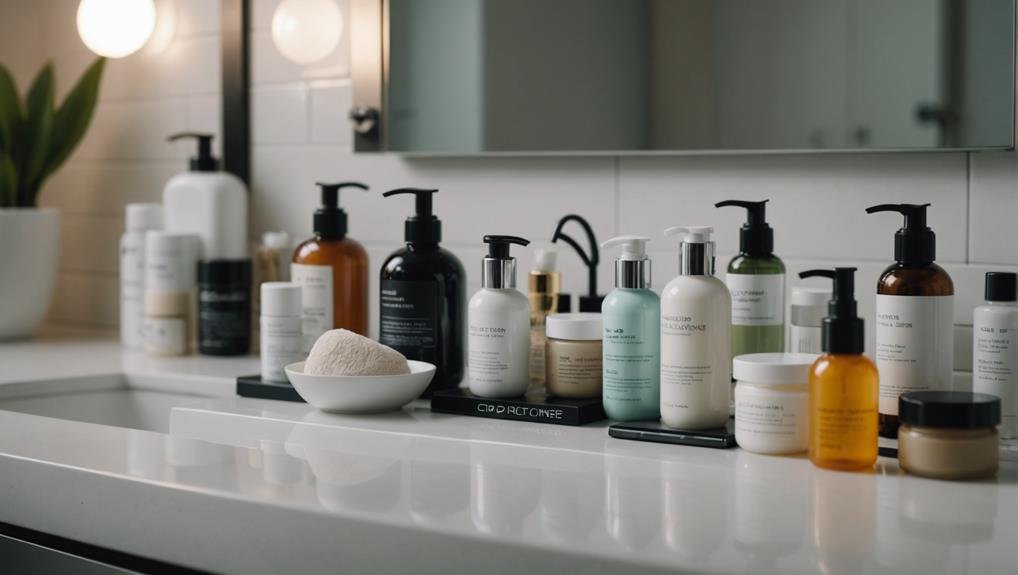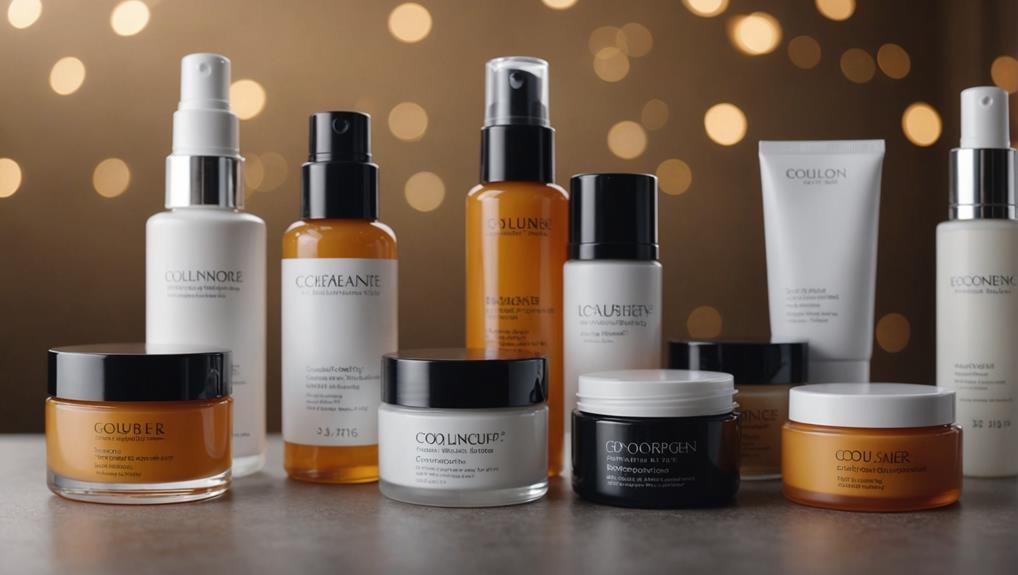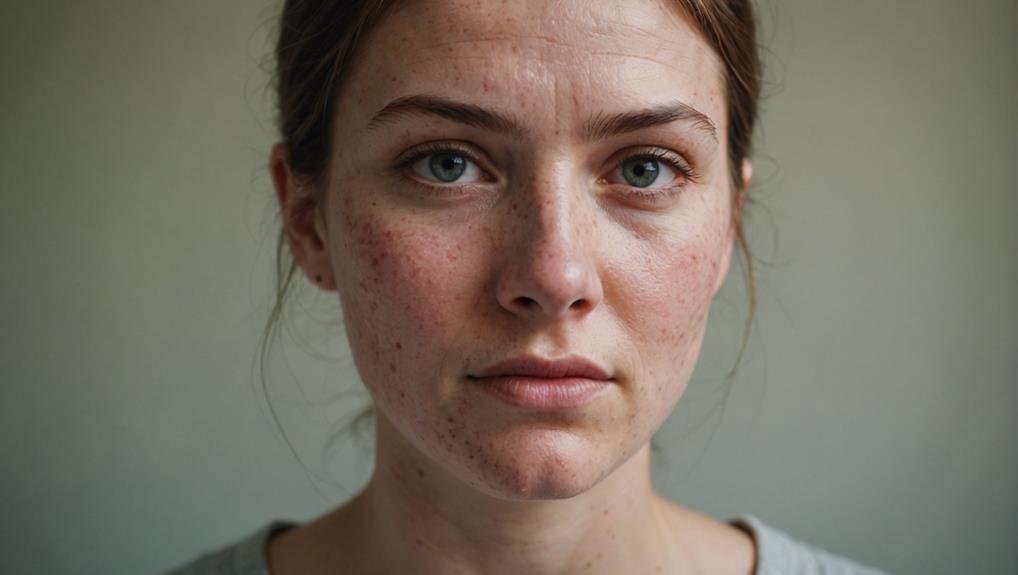"Cherishing Little Steps - A Haven for Baby and Family Journeys"
Skincare Myths You Need to Stop Believing#COMMA
You may have heard various skincare myths that could be impacting your routine without you even realizing it. From the belief that harsh scrubs lead to smooth skin to thinking that natural products are always gentle, there are misconceptions that could be harming your skin. Understanding the truth behind these myths is essential for achieving healthy and radiant skin. Let's uncover and debunk some of these misconceptions to help you make informed decisions about your skincare regimen.
Key Takeaways
- Harsh scrubs damage the skin barrier; opt for AHAs, BHAs, or enzymes for gentle exfoliation.
- Natural products can still cause irritation; always patch test and consult a dermatologist.
- Quality over quantity is crucial in skincare products to avoid overloading the skin.
- Oily skin needs hydration; use lightweight, non-comedogenic moisturizers to regulate oil production.
Harsh Scrubs Cause Smooth Skin

Contrary to popular belief, harsh scrubs don't necessarily lead to smoother skin as they can cause irritation and damage to the skin barrier. Gentle exfoliation is key to achieving effective results without compromising skin health.
When selecting skincare products, it's crucial to consider the ingredients and their impact on skin sensitivity. Opt for exfoliants that contain gentle ingredients like alpha hydroxy acids (AHAs), beta hydroxy acids (BHAs), or enzymes. These compounds work to slough off dead skin cells without the abrasive nature of harsh physical exfoliants.
AHAs, such as glycolic acid, are great for dry or sun-damaged skin, while BHAs, like salicylic acid, are ideal for oily or acne-prone skin. Enzymes, such as papain from papaya, offer a gentle exfoliation option for sensitive skin types.
Natural Means Safe for Skin
Using natural skincare products doesn't inherently guarantee safety for your skin, as some natural ingredients can still cause irritation or allergic reactions. While organic ingredients can offer benefits, it's essential to be mindful of potential adverse effects.
Here's what you should consider:
- Organic Doesn't Equal Hypoallergenic: Just because a product boasts organic ingredients doesn't mean it's suitable for all skin types. Natural substances like essential oils can trigger allergies or sensitivity in some individuals.
- Chemical Exfoliants vs. Natural Scrubs: Chemical exfoliants, such as AHAs and BHAs, are often gentler and more effective at renewing skin compared to harsh natural scrubs like walnut shell or apricot. Opting for well-formulated chemical exfoliants can be safer for your skin.
- Patch Test Every Product: Regardless of whether a product is natural or synthetic, always conduct a patch test to check for any adverse reactions before applying it all over your face.
- Consult a Dermatologist: If you have sensitive skin or are unsure about certain natural ingredients, seek advice from a dermatologist to ensure the products you use are safe and effective for your skin type.
More Products = Better Results

Increasing the number of skincare products in your routine doesn't necessarily guarantee better results for your skin. The idea that more products equal better outcomes is a common misconception in the world of skincare. In fact, the principle of 'less is more' often holds true when it comes to taking care of your skin. Quality over quantity should be the guiding principle when selecting products for your skincare regimen.
Using too many products can overwhelm your skin and disrupt its natural balance. It can also lead to irritation, sensitivity, and even exacerbate existing skin issues. By focusing on high-quality products that cater to your skin's specific needs, you can achieve better results without overloading your skin with unnecessary ingredients.
Instead of piling on numerous products, consider streamlining your routine with a select few that are effective and suitable for your skin type. This approach allows the products to work synergistically and deliver optimal benefits to your skin.
Oily Skin Doesn't Need Moisturizer
It's a common misconception that oily skin doesn't require moisturizer, but this belief isn't necessarily accurate. Oily skin still needs proper hydration to maintain a healthy balance and prevent overproduction of oil.
Here's why moisturizing is essential for oily skin:
- Regulates Oil Production: When oily skin isn't adequately moisturized, it can compensate by producing even more oil, leading to a greasier complexion.
- Prevents Dehydration: Lack of hydration can trick the skin into producing more oil, exacerbating the oiliness and potentially causing breakouts.
- Maintains Skin Barrier: Moisturizer helps strengthen the skin's natural barrier, protecting it from external aggressors and maintaining overall skin health.
- Balances the Skin: Using a lightweight, non-comedogenic moisturizer can help balance oily skin without clogging pores.
In addition to moisturizing, gentle exfoliation can aid in managing oily skin by removing excess oil and dead skin cells.
Sunscreen Is Only for Sunny Days

Should sunscreen only be used on sunny days?
One of the common sunscreen misconceptions is that UV protection is only necessary when the sun is shining brightly. However, UV rays can penetrate through clouds and cause skin damage even on overcast days. To prevent skin damage effectively, it's essential to apply sunscreen year-round.
UV radiation is present throughout the year, and exposure to UVA and UVB rays can lead to premature aging, sunburn, and an increased risk of skin cancer. By incorporating sunscreen into your daily skincare routine regardless of the weather, you can protect your skin from these harmful effects.
Remember that UV rays can also reflect off surfaces such as snow, water, and even concrete, intensifying their damaging effects. Therefore, consistent application of sunscreen is crucial for maintaining healthy skin and preventing long-term damage. Make it a habit to apply a broad-spectrum sunscreen with at least SPF 30 every day, reapplying every two hours if you're outdoors, to ensure optimal protection year-round.
Acne Is Only Teenagers' Worry
Contrary to popular belief, acne isn't solely a concern for teenagers. Adult acne is a common issue that many individuals face due to various factors such as hormonal changes, stress, and diet.
Here's why acne can affect adults of all ages:
- Adult Acne: Hormonal changes in adulthood, especially in women, can lead to breakouts similar to those experienced during puberty. Fluctuations in hormone levels can trigger excess oil production, leading to acne flare-ups.
- Stress: High levels of stress can contribute to the development of acne in adults. Stress triggers the release of hormones like cortisol, which can stimulate oil production and inflammation in the skin, worsening acne.
- Diet: What you eat can impact your skin health. Consuming a diet high in processed foods, sugars, and dairy products may exacerbate acne in adults by increasing inflammation and oil production.
- Treatment: Understanding that acne can affect adults is crucial for finding the right treatment options tailored to adult skin, such as incorporating gentle skincare products and seeking professional help when needed.
Expensive Products = Effective Products

Expensive skincare products are often perceived as more effective, but this belief may not always hold true in reality. While celebrity endorsements and brand loyalty can create a perception of superiority, the price tag alone doesn't guarantee efficacy.
Celebrity endorsements can sway consumer perception, making it seem like a product is a must-have for flawless skin. However, these endorsements may not always reflect the product's actual effectiveness. Celebrities are often paid to promote products, and their glowing skin can be attributed to a team of skincare experts rather than a single product.
Similarly, brand loyalty can lead individuals to believe that expensive products are superior simply because of the brand's reputation. This loyalty may overlook more affordable options that are equally effective.
Makeup Worsens Skin Conditions
Using makeup doesn't necessarily worsen skin conditions, as long as you choose products suitable for your skin type and follow a consistent skincare routine.
Here are four essential tips to ensure that makeup doesn't negatively impact your skin:
- Makeup Removal: Always remove your makeup before going to bed. Leaving makeup on overnight can clog pores, leading to breakouts and skin irritation.
- Choose Non-Comedogenic Products: Opt for makeup labeled as non-comedogenic, meaning it won't clog pores. This helps prevent acne and other skin issues.
- Skin Hydration: Prioritize keeping your skin hydrated by using a moisturizer suitable for your skin type. Hydrated skin is less prone to irritation and breakouts.
- Regular Skincare Routine: Establish a consistent skincare routine that includes cleansing, toning, moisturizing, and applying makeup. Consistency helps maintain skin health and prevents exacerbation of skin conditions.
Dry Skin Needs Hot Water

To address the misconception that dry skin needs hot water, it's important to understand the impact of water temperature on skin health. While a steamy shower might seem comforting, hot water can actually strip your skin of its natural oils, exacerbating dryness. Instead, opt for lukewarm showers to help maintain your skin's hydration levels.
For dry skin, incorporating hydrating serums into your skincare routine can work wonders. These serums are packed with ingredients like hyaluronic acid that attract moisture to the skin, helping to combat dryness effectively.
Additionally, gentle exfoliation can help remove dead skin cells that may be contributing to the flakiness often associated with dry skin.
Hydrating masks are another beneficial addition to your skincare regimen. These masks provide an extra dose of moisture and nourishment, leaving your skin feeling soft and supple.
Skincare Routines Should Be Daily
Consistency in your skincare routine is essential for maintaining healthy skin. Establishing daily habits can help you achieve glowing and radiant skin. Here are some key reasons why daily skincare routines are crucial:
1. Nighttime routines:
Your skin goes through a renewal process while you sleep. By cleansing, moisturizing, and applying treatments before bed, you can maximize the benefits of this natural regeneration.
2. Daily protection:
Consistent use of sunscreen and antioxidants during the day shields your skin from harmful UV rays and environmental stressors, preventing premature aging and damage.
3. Maintaining skin balance:
Regular cleansing and hydration routines help regulate oil production and keep your skin's pH levels in check, promoting a healthy complexion.
4. Weekly treatments:
Introducing weekly exfoliation, masks, or serums can address specific skin concerns and boost the effectiveness of your daily routine, leading to more significant improvements over time.
DIY Skincare Is Always Safe

Engaging in do-it-yourself skincare practices may not always guarantee safety for your skin. While DIY skincare can be a fun and cost-effective way to pamper yourself, it's crucial to approach it with caution. Professional expertise is essential when it comes to formulating skincare products that are safe and effective for your skin type.
One common misconception is that all-natural ingredients are inherently safe. While natural ingredients can offer benefits, such as hydration or antioxidant protection, they can also cause irritation or allergic reactions in some individuals. Without the guidance of a skincare professional, it can be challenging to determine which ingredients are suitable for your specific skin concerns.
Moreover, DIY skincare recipes found online may lack the scientific backing necessary to ensure their safety. Professional dermatologists and skincare experts undergo extensive training to understand how different ingredients interact with the skin and can provide personalized recommendations based on your unique needs.
When it comes to skincare, trusting professional expertise is key to maintaining healthy and radiant skin.
Genetics Dictate Skincare Outcomes
The belief that skincare outcomes are solely dictated by genetics is a prevalent misconception in the beauty industry. While genetic predispositions can influence certain aspects of your skin, such as sensitivity or oil production, they don't determine the overall health and appearance of your skin.
Here's why:
- Skincare routines and genetics: Your daily skincare habits play a significant role in how your skin looks and feels. A consistent skincare routine tailored to your skin type and concerns can greatly impact its overall condition, regardless of your genetic makeup.
- Age and skincare outcomes: As you age, your skin undergoes changes influenced by a variety of factors, including genetics, lifestyle choices, and environmental exposures. While genetics may influence how your skin ages to some extent, proactive skincare measures can help mitigate the effects of aging.
- Diet and skincare: What you eat can impact your skin's health and appearance more than your genetics alone. A balanced diet rich in antioxidants, vitamins, and hydration can promote skin vitality and combat signs of aging.
- Environmental factors: Sun exposure, pollution, and other environmental stressors can affect your skin's health and appearance, regardless of your genetic predispositions. Protecting your skin from these external aggressors through sunscreen use and proper skincare can help maintain its youthful glow.
Frequently Asked Questions
Can I Use Body Scrubs on My Face?
You shouldn't use body scrubs on your face. Facial exfoliation is crucial for healthy skin. Consider your skin type when choosing products. Using the right products ensures effectiveness and avoids potential irritation or damage.
Is It Okay to Skip Moisturizer if I Have Oily Skin?
You may think skipping moisturizer with oily skin is wise, but hydration balance is crucial for all skin types. Moisturizers formulated for oily skin can help maintain this balance, preventing excess oil production.
Should I Wear Sunscreen Indoors?
You should wear sunscreen indoors to protect your skin from UV rays that can lead to skin aging. Even though you may not be directly in the sun, UV rays can penetrate windows and cause damage.
Can Adults Develop Acne?
You can develop acne as an adult due to hormonal changes and diet factors. It's common and treatable. Consistent skincare routine, healthy diet, and stress management can help improve your skin condition. Consult a dermatologist for personalized advice.
Will Expensive Skincare Products Guarantee Results?
When considering skincare budgeting, keep in mind that pricey products don't always guarantee results. DIY skincare can be effective, but professional treatments may offer more targeted solutions. Focus on product effectiveness rather than just the price tag.
Conclusion
Now that you've debunked these skincare myths, imagine your skin as a delicate flower garden. Treat it with care, nourish it with the right products, and shield it from harmful elements.
Just as a gardener tends to their plants diligently, you too must nurture your skin consistently to see it flourish and bloom with health and radiance.
Embrace the truth, discard the myths, and watch your skincare routine blossom into a thing of beauty.

